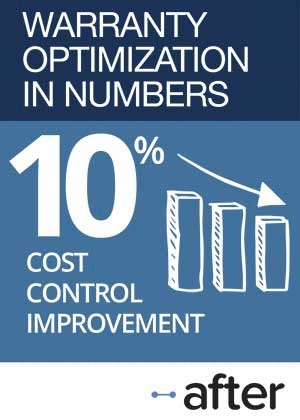Service Contract Insurance Stocks:
Though there are very few publicly-traded companies that derive most of their revenues from sales of extended warranties, almost a dozen public companies have a significant share of the business. Whether it's from home warranties, auto, electronics or mobile phones, the success of their protection plan sales efforts provide investment opportunities to outsiders.
Though the barriers to entry are extremely high, there's a relatively easy way to buy a small stake in the extended warranty industry. All you have to do is purchase some shares in one of at least 11 public companies with a significant interest in the business.
Last week, we detailed the members of our A-Team of Extended Warranties, consisting of 10 companies with leading roles in the service contract industry. This week, we're revisiting five of them, examining them as investments rather than purely as market share leaders, and we're looking at six additional publicly-held companies that are also leaders in the field, but whose names don't happen to begin with the letter A.
All but one pay dividends, and most have also appreciated significantly in price in recent years. However, all 11 have peaked in price at some time earlier this year. So the question is, will they resume their upward climb soon? Or will their declines continue to accrue?
First, in terms of full disclosure, Warranty Week is a newsletter about the service contract and product warranty industries, and is not an investment advisor, and none of what follows should be seen as investment advice, nor a solicitation to any person of any offer to purchase any securities. Our goal is to merely inform readers that these investment opportunities exist in what is otherwise a largely opaque and privately-held industry. If you have any doubts as to the merits of a specific investment described below, you should seek advice from an independent financial advisor.
Second, Warranty Week employees are not permitted to invest in any companies we write about, so we do not own and will not own any shares in these companies, either directly or indirectly. Third, AmTrust/Warrantech currently is, and Assurant Solutions previously was, a major sponsor of this newsletter, but that status will not affect the objectivity of our coverage, now or in the future.
For each of the companies below, we've provided a brief profile, a chart of their stock price, and some links to additional information. In each case, the price charts begin on September 15, 2008 and end this month, more than nine years since the week that nearly wrecked the finance and insurance industries.
AIG

Let's start with AIG. The American International Group Inc. (Ticker: AIG) was founded in Shanghai by Cornelius Vander Starr in 1919. It eventually became the world's largest insurance company, before nearly failing during the 2008 financial crisis.
Shares of AIG, after adjusting for reverse splits and other factors, were trading for several hundred dollars each in early September 2008, before falling precipitously as the crisis began to unfold. On September 15, the day that Lehman Brothers filed for bankruptcy, they closed at $74.03 per share. By early March 2009, when the end of the world looked near, they bottomed-out at only 27 cents per share (the equivalent of $5.44 after a 1-for-20 reverse split performed later that summer).
Now, they're trading respectably again, in the high 50s and low 60s. The U.S. government sold the last of its AIG shares in late 2012, and the company launched a "Thank You America" advertising campaign soon after.
Figure 1
American International Group (AIG) Common Stock Price
(US$ per share, 2008-2017)
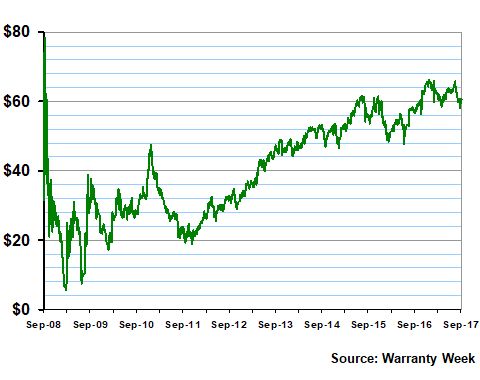
Here's the paradox: While service contracts represent only a small part of AIG's total revenue, AIG represents a major part of the service contract industry worldwide. AIG's Warranty Division, through both the Illinois National Insurance Company and the New Hampshire Insurance Company, underwrites the service contracts of Best Buy and several other retailers, and provides the underwriting for the accidental damage protection of the AppleCare extended warranty program. It used to also underwrite the service contracts of Wal-Mart and Kmart, until the administrator it was working with at the time was acquired by a company that worked with another insurance company.
In 2012 AIG acquired Service Net Solutions LLC, an administrator founded in 1996 by some ex-GE veterans in a historic building across the river from the GE Appliances headquarters in Louisville. Along with Service Net came a thriving HVAC extended warranty business, and key accounts such as CDW and Newegg.com.
Thanks to the incredible worldwide growth of the Apple iPhone, AppleCare is now the world's largest extended warranty program of any kind, selling an estimated $7.25 billion worth of contracts in the year ended September 2015, and an estimated $5.9 billion in the year ended September 2016 (we'll have an update on this fiscal year in late October).
And because of AppleCare and Best Buy, as well as several other accounts, we estimate that AIG's name is on roughly 21% of the service contracts sold in the U.S. for mobile phones, appliances, and electronics. That's second only to Asurion, which dominates the mobile phone insurance segment of the protection plan industry.
AIG resumed dividend payments in December and is now paying out 32 cents per quarter, for an annual yield of 2.1% based on today's closing price of $60.97 per share. The financial strength ratings of its underwriters continue to get an A (Excellent) grade from AM Best, while its senior debt rates a BBB+ (Investment Grade) from Standard & Poors.
Allstate

Long before it acquired SquareTrade Inc. in early January, Allstate Corp. (Ticker: ALL) was already a major player in the extended warranty industry. Allstate Dealer Services, its administrator Pablo Creek Services Inc., and its underwriter First Colonial Insurance Company, have a major presence in the vehicle service contract industry, selling through dealers as well as working with several independent administrators. ERJ Insurance Group Inc., doing business as American Heritage Insurance Services, administers Allstate's Guaranteed Asset Protection (GAP) program.
Back in a September 2010 newsletter, Warranty Week estimated that Allstate controlled 9.5% of the VSC market in the U.S., behind only Assurant and The Warranty Group. As the market has grown in the seven years since, we estimate that Allstate's share has grown a bit larger.
Allstate's common shares briefly dipped below $60 in late 2015 and early 2016 before resuming a steady climb that has brought them as high as $95.25 in recent months.
Figure 2
Allstate (ALL) Common Stock Price
(US$ per share, 2008-2017)
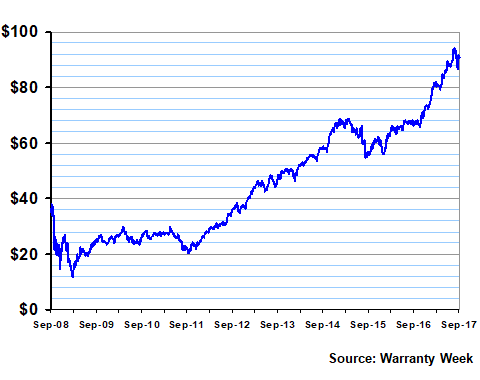
Allstate raised its dividend to 37 cents per quarter in February, for an annual yield of only 1.6% based on today's closing price of $91.29 per share.
The SquareTrade acquisition rounds out the company's offerings by adding retail electronics, mobile phones, and appliances to the products covered by Allstate-run protection plans. SquareTrade, through subsidiaries such as CE Care Plan Corp., Complete Product Care Corp., SquareTrade Protection Solutions Inc., and ST Product Care Corp., is usually both the administrator and the obligor for the service contracts its retail partners sell.
SquareTrade also sells direct through its own website. And unlike most of its competitors, it features its own brand prominently, even when selling through its retail partners. The company strives to maintain the highest possible customer satisfaction ratings, especially on websites that feature customer reviews.
However, SquareTrade is not and has not been profitable. After the acquisition closed in early January, Allstate revealed that SquareTrade has lost money in each of the previous five years. In 2015, SquareTrade had revenue of $259 million and a net loss of $26.5 million. In 2014, SquareTrade had sales of $192 million and a net loss of $37.4 million. Allstate has not published any financial reports for SquareTrade in 2016, but in the first half of 2017, Allstate reported $166 million in SquareTrade premiums written and a further $57 million in underwriting losses. SquareTrade's combined ratio was an embarrassing 144%, meaning, essentially, that they're charging only 70 cents for every dollar of protection.
Still, SquareTrade is one of the best-known extended warranty administrators in the business, providing its own branded protection plans on a major share of the Amazon.com website, as well as through retailers such as Costco Wholesale, Office Depot, Staples, Sam's Club, and Target. Most are underwritten by Starr Indemnity & Liability Company, but some have moved over to Continental Casualty Company, a unit of CNA Financial Corp. None are using Allstate underwriters, however, and no plans have been announced to get them to switch.
AmTrust
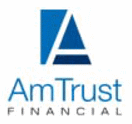
AmTrust Financial Services Inc. (Ticker: AFSI) was founded in 1998 by Barry Zyskind, the chairman and CEO, along with brothers George and Michael Karfunkel. They soon acquired the extended warranty business known as Technology Insurance Company Inc., a spin-off from Wang Laboratories, and turned it into a foothold in the service contract industry.
In 2006, AmTrust acquired Wesco Insurance Co., which along with TIC remain its underwriting arms to the present day. AmTrust acquired Warrantech in 2010, gaining an increased presence in the administration side of the business. Wesco works with both AMT Warranty Corp. and Warrantech Automotive Inc., two of the company's VSC administrators. But it also underwrites VSCs for several independent administrators, such as Royal Administration Services Inc.
In a 2010 VSC market sizing, Warranty Week estimated AmTrust and Warrantech to have a 6.1% share of what was then an $11.75 billion industry (measured by the amount of premiums paid by U.S. consumers for VSCs). So it's long been a top 10 provider in that market segment. In 2015, AmTrust bought VSC administrator Warranty Solutions from Wells Fargo & Co., adding to its market share. In the UK, AmTrust acquired the VSC administrator Car Care Plan Holdings in 2012.
Administrator Warrantech Consumer Product Services Inc. has clients such as BrandsMart USA, a portion of the Amazon.com account, Microsoft, Menard's, and several other manufacturers and retailers. However, one of its largest clients, appliance and electronics retail chain hhgregg, went bankrupt in March, though the company is set to reopen under new ownership on October 1.
AmTrust's Specialty Risk and Extended Warranty segment is the home of all its service contract interests. AmTrust reported $2.5 billion in gross written premium in this segment last year, accounting for a little less than a third of the entire company's revenue. A little over a billion of that was written in the U.S. About $429 million came from the UK. We estimate that about $1.6 billion, or 63% of the segment, is extended warranty, while the remainder is specialty risk.
As can be seen in the chart below, AmTrust traded as high as $33 per share back in the summer of 2015, before dipping into the 20s and then the teens in the two years since. The open question is, does this represent a buying opportunity or is it the start of a decline after the peak?
Figure 3
AmTrust (AFSI) Common Stock Price
(US$ per share, 2008-2017)
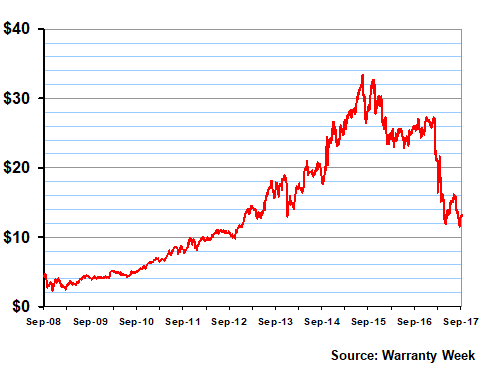
Short sellers have been conspiring in recent years to drive the stock price down with their allegations. Much publicity was given to a story in April that featured an auditor from BDO making his way around the AmTrust offices, asking colleagues to speak into a Starbucks gift card that secretly housed a recording device. Turned out he was also secretly working for the FBI.
In downtown New York City, where AmTrust is based, there's a saying that "money talks, everything else walks." Last October, AmTrust raised its quarterly dividend to 17 cents per share, for a relatively generous annual yield of 5.0%, based on today's closing price of $13.70 per share. And at that level, it represents the highest yield among all the service contract investments we can find. So again, we ask, is this a buying opportunity, or is it a value trap?
Assurant Inc.

Assurant Inc. has a significant presence on both the vehicle and the retail sides of the service contract industry. And on the retail side, it also has a significant presence in all three of the top product sectors for extended warranties: mobile phones, electronics, and appliances.
The company traces its roots back to Wisconsin, where the La Crosse Mutual Aid Association was formed 125 years ago. It changed its name to the Time Insurance Company in 1890, and was acquired by a Dutch company in 1978. In 1991, the Dutch parent changed its name to Fortis Insurance, and in 1999 it acquired American Bankers Insurance Company of Florida.
Five years later, Fortis decided to spin off its U.S.-based portion of its business into a separate company. That company, renamed Assurant Inc. (Ticker: AIZ), went public in February 2004. American Bankers Insurance Company of Florida remains its primary underwriter in the service contract industry, while either Federal Warranty Service Corp. or Signal Service Solutions LLC are usually listed as the administrators.
In 2015, Assurant announced its intent to exit the health insurance industry, to focus on service contracts, renters insurance, annuities, flood insurance, and funeral expense pre-payment services. After completing that sale, Assurant reorganized its business units. What was once called Assurant Solutions is now part of the Global Lifestyle segment, which includes Global connected living (mobile phone insurance and retail service contracts), Global vehicle protection services, Global credit, and other.
Out of an estimated $2.2 billion in net earned premiums reported for service contract sales in the U.S. last year, we estimate that roughly 40% came from retail electronics and appliances, while about 35% came from vehicle service contracts, and about 25% came from mobile phone insurance. Both VSCs and mobile phone insurance are growing at a good clip.
On the retail electronics and appliance side, however, Assurant Solutions seems to be on a downward slope. Over the past few years, it lost the Staples account to SquareTrade, lost Home Depot to Asurion LLC, and lost Radio Shack, CompUSA, and Circuit City to bankruptcies. As a result, we estimate that its net earned premiums in this sector declined about 10% last year. But it still has large accounts such as T-Mobile and Lowe's, along with a minority share of the Amazon.com account. And it has a promising international service contract business as well, which adds another billion dollars to its revenue stream.
Shares of Assurant peaked at a price of $106.99 in July 2017. They fell back below $90 in early September, but have recovered somewhat since.
Figure 4
Assurant (AIZ) Common Stock Price
(US$ per share, 2008-2017)
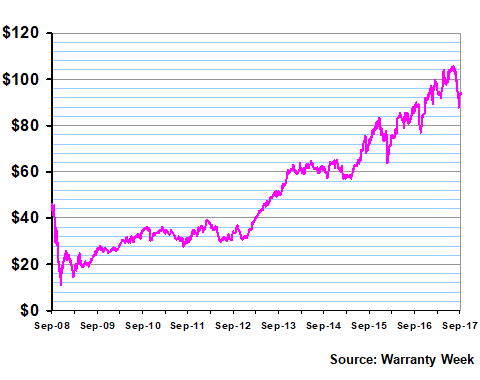
Assurant raised its quarterly dividend to 53 cents a share in November, giving its shares an annual yield of 2.2% based on today's closing price of $95.78 per share. With 10-year U.S. Treasury bonds currently yielding 2.3%, the question is, which is a better investment in the long run?
CNA Financial
 The CNA Financial Corp. (Ticker: CNA) takes its name from the first letter of three of its major acquisitions: the Continental Casualty Company, the National Fire Insurance Company, and the American Casualty Company. It was formed in Detroit in 1897 to provide insurance services to railroad employees, though it long ago sold off those operations and moved to Chicago.
CNA has an extensive presence on both the vehicle and the retail sides of the service contract industry. Its Specialty Insurance business segment, which includes Warranty and Alternative Risks, reported $2.78 billion in net written premium last year, an 85% combined ratio, and $650 million in operating income.
CNA National Warranty Corp. is the name of the VSC and GAP operation. The Continental Casualty Company is underwriting retail service contracts, for administrators such as Asurion Service Plans Inc. and SquareTrade Inc., on behalf of clients such as AT&T, Sprint, Walmart, QVC, and B&H Photo.
The CNA Financial Corp. (Ticker: CNA) takes its name from the first letter of three of its major acquisitions: the Continental Casualty Company, the National Fire Insurance Company, and the American Casualty Company. It was formed in Detroit in 1897 to provide insurance services to railroad employees, though it long ago sold off those operations and moved to Chicago.
CNA has an extensive presence on both the vehicle and the retail sides of the service contract industry. Its Specialty Insurance business segment, which includes Warranty and Alternative Risks, reported $2.78 billion in net written premium last year, an 85% combined ratio, and $650 million in operating income.
CNA National Warranty Corp. is the name of the VSC and GAP operation. The Continental Casualty Company is underwriting retail service contracts, for administrators such as Asurion Service Plans Inc. and SquareTrade Inc., on behalf of clients such as AT&T, Sprint, Walmart, QVC, and B&H Photo.
CNA shares peaked at $53.67 back in August, and slipped below $50 again this month. But they've peaked and swooned in both 2011 and 2015, before resuming their climb soon afterwards.
Figure 5
CNA Financial (CNA) Common Stock Price
(US$ per share, 2008-2017)
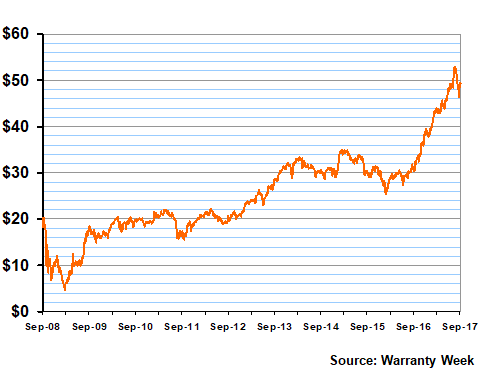
CNA just recently raised its quarterly dividend to 30 cents a share, giving it an annual yield of 2.4% based on today's closing price of $50.00 per share. So the open question is if that's a bargain or not?
Old Republic

Old Republic International Corp. (Ticker: ORI) is one of only a few companies to have interests in both the vehicle service contract and home warranty sectors of the protection plan industry.
Its home and automobile warranty operations reported $274.6 million in net premiums earned in 2016, which was a little under 10% of the General Insurance Group's overall total. Old Republic Home Protection Company Inc., which the parent company acquired in 1982, is the home warranty provider. Old Republic Insured Automotive Services Inc., also known as ORIAS, is the VSC administrator.
Like many of the others profiled in this week's newsletter, the price of Old Republic's shares peaked recently, and has fallen since. Shares first closed above $20 in January, and hit their peak of $21.19 in early February. They last traded above $20 in July, and briefly dipped below $18 earlier this month.
Figure 6
Old Republic (ORI) Common Stock Price
(US$ per share, 2008-2017)
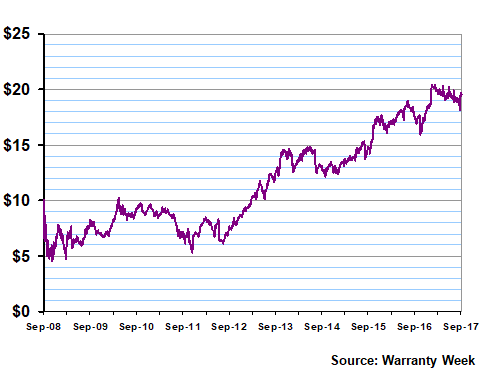
Old Republic is one of a relatively small pool of insurance companies that has increased its dividend at least once a year for more than 36 consecutive years. It raised its quarterly dividend to 19 cents a share in March, giving its common stock an attractive annual yield of 3.9% based on today's closing price of $19.73 per share.
Fidelity National
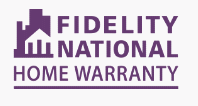
Fidelity National Financial Inc. (Ticker: FNF) is best known as a provider of title insurance services to homeowners, and secondarily as a provider of home warranties. In a 2009 market sizing, Warranty Week estimated the market share of Fidelity National Home Warranty to be approximately 4.3% of a $1.5 billion industry, which placed them in sixth place.
Fidelity reports its title insurance and home warranty revenue together, so there is no way for external observers to independently confirm its market share in the latter market segment. Title premiums were reported at $4.7 billion in 2016, up from $4.3 billion in 2015. Fidelity said fees in the segment that includes home warranties increased by $21 million last year, "primarily attributable to revenue growth associated with our home warranty businesses as well as acquisitions." In early 2015, it acquired home warranty provider Buyers Protection Group Holdings LLC, at a reported cost of $46 million.
Besides title insurance and home warranties, the company also owns 55% of American Blue Ribbon Holdings LLC, which in turn owns restaurant chains such as O'Charley's and Ninety Nine. It also owns a majority of Black Knight Financial Services Inc., which provides technology and analytics services to the home mortgage industry. However, it intends to spin off this investment in the near future by distributing the shares it owns to existing shareholders.
The company's shares set a record high of $49.37 in early August before falling back slightly in recent weeks. It followed a similar pattern in 2014, peaking, then falling, then rising to new heights. However, if this is the beginning of yet another swoon, then it has really just begun.
Figure 7
Fidelity National (FNF) Common Stock Price
(US$ per share, 2008-2017)
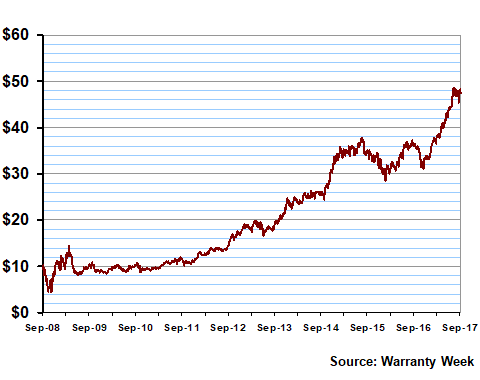
Fidelity National raised its quarterly dividend to 25 cents a share in December, giving it an annual yield of 2.1% based on today's closing price of $47.04 per share.
Mercury Insurance Group

Mercury General Corp. is a provider of personal auto insurance, homeowners insurance, and what's called mechanical breakdown insurance. When it's sold by a non-insurance company, they call it an extended warranty or a vehicle service contract. But since Mercury General is a traditional insurance company, it's called mechanical breakdown protection.
Mercury General was founded in 1961 by George Joseph, the company's current CEO. More than 77% of the company's insurance policies are written for passenger cars, and 84% of the company's premiums are written in California. In 2016, the "other" business segment, which includes mechanical breakdown insurance, accounted for about 3.7% of the company's $3.17 billion in total revenue.
Mercury General's shares (Ticker: MCY) peaked at a price of $64.52 per share in early 2017. They threatened to surpass that mark in April before falling back again. For most of the time since, they've traded in a narrow range between $55 and $60.
Figure 8
Mercury Insurance (MCY) Common Stock Price
(US$ per share, 2008-2017)
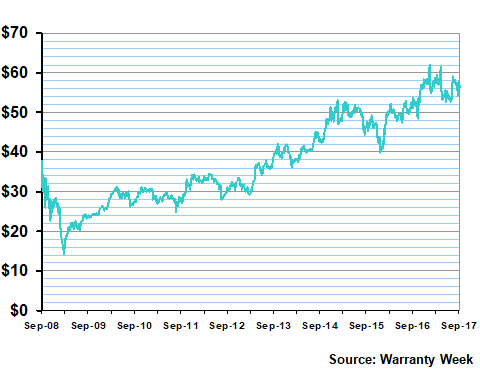
Mercury raised its quarterly dividend to 62.3 cents per share in December, giving it an annual yield of 4.4% based on today's closing price of $56.76 per share.
More Investments
And then there are three additional publicly-held companies with significant states in the service contract industry, whose shares didn't begin trading publicly until after 2008. Ally Financial Inc., another member of our A-Team, went public in January 2014 (Ticker: ALLY). Ally raised its dividend to 12 cents a share in July, giving it an annual yield of 2.0% based on today's closing price of $23.89 per share.
First American Corp., another title insurance company with interests in home warranties, went public in May 2010 (Ticker: FAF). First American raised its quarterly dividend to 38 cents per share in September, giving it an annual yield of 3.1% based on today's closing price of $49.68 per share.
And then finally, we have ServiceMaster Global Holdings Inc. (Ticker: SERV), the owners of American Home Shield, which we estimate to have a 46% share of the home warranty industry (although AHS is slated to be spun off into a separate company late next year). ServiceMaster went public in June 2014. Its shares closed today at a price of $47.26. However, the company does not pay dividends.






